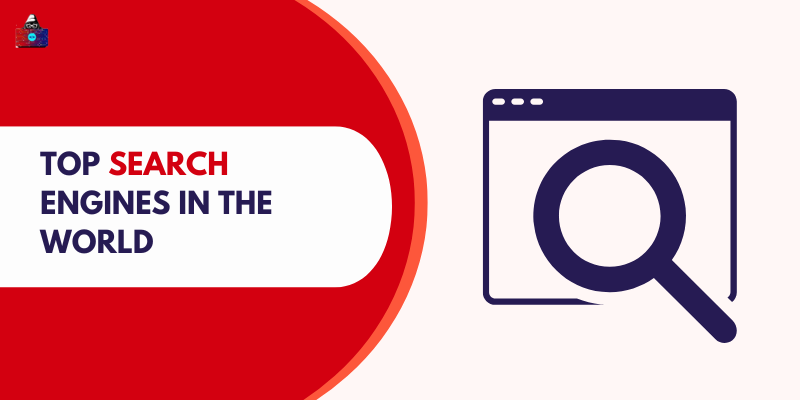Search engines are the platforms from which we actually connect to the internet, helping billions of users to discover any kind of information if they want, whether it is products or services, each and every single day. From just simple keyword research to right now having an advanced AI-powered recommendation, the search technology has truly evolved over the past two decades.
In 2025, search engines will do more than just give a result about web pages. They will personalize the content, understand the natural language in a better way, and even predict the user's intent. While Google continues to dominate the global market, several other search platforms are gaining traction by focusing on privacy, regional relevance, and specialized use cases.
What Defines a Top Search Engine?
Not every search engine earns global dominance. The best ones share a few key characteristics that determine their popularity and reliability.
1. Popularity and Market Share
A top search engine must have a large user base. This indicates reliability, accuracy, and consistent performance. Global presence and multilingual support often contribute to popularity.
2. Speed and Efficiency
Speed is one of the important factors for search engines. Users need quick and accurate results specifically on mobile where load times matter the most.
3. Privacy and Security
Today, personal data of users is targeted and misused and so, it is very important for the users to protect their privacy. Anonymous browsing and no-tracking policies appeal to the privacy-conscious user.
4. Accuracy and Relevance of Results
For search engines, the goal is always to provide an accurate result. Advanced algorithms should understand the user's intent, context, and search behavior to ensure smooth and meaningful experience.
5. Regional and Global Usage
Some search engines excel globally while some focus on dominating the local markets. Understanding the regional languages, preferences and cultural nuances is very important for delivering effective search results.
Top Search Engines in the World (2025)
Some of the search engines that are leading in 2025 are mentioned below with their advantages, drawbacks, and some tips.
1. Google
Google is holding the top spot with over 90% of the global market share. It’s not only fast but also comprehensive and deeply integrated into mobile and desktop ecosystems.
Pros
- It has the unmatched accuracy and search depth
- Provides you with the AI-driven personalization
- Rich snippets, Knowledge Graph, and visual search features
- Seamless integration with Android, Chrome, and Google Workspace
Cons
- It tracks the user data with unwanted ads
- It limits visibility for any smaller search engines
Optimization Tips
- It heavily focuses on E-E-A-T (Experience, Expertise, Authoritativeness, Trustworthiness)
- It has the voice and visual search
- It has the structured format for the visibility
2. Bing
It is owned by Microsoft Bing ranks second globally and powers Yahoo’s search results. It’s gaining traction with Microsoft’s integration of AI (Copilot) into Windows and Edge.
Pros
- Cleaner interface and high-quality image search
- Integration with Microsoft products
- Strong AI-powered search assistance
Cons
- Smaller index compared to Google
- Lower search volume outside the U.S.
Optimization Tips
- Submit sites via Bing Webmaster Tools
- Use schema markup for better display in results
- Target desktop and voice search users
3. Yahoo
Though it has declined since its early dominance, Yahoo remains relevant, especially in the U.S. and Japan. It combines Bing’s search engine with Yahoo’s unique news and finance content.
Pros
- Trusted brand with loyal users
- Strong focus on news, finance, and entertainment
- Easy integration with email and media services
Cons
- Relies on Bing for core search technology
- Limited innovation compared to competitors
Optimization Tips
- Optimize for rich media and news content
- Target Yahoo News and Yahoo Finance for brand exposure
4. Baidu
China’s leading search engine, Baidu, dominates the local market with over 75% share. It’s designed for the Chinese language and regulated by local internet policies.
Pros
- Highly optimized for Chinese search
- Integrated with local services (maps, video, forums)
- AI-driven results and image recognition
Cons
- Limited access outside China
- Strict government censorship
Optimization Tips
- Use Simplified Chinese keywords
- Host websites on Chinese servers for faster access
- Obtain an ICP license (required for hosting in China)
5. Yandex
Russia’s largest search engine, Yandex, also serves users in Eastern Europe and Turkey. It’s known for superior handling of morphologically rich languages like Russian.
Pros
- Excellent local search relevance
- Integrated with Yandex Mail, Maps, and Market
- Robust analytics tools for webmaster
Cons
- Limited global reach
- Privacy concerns similar to Google
Optimization Tips
- Localize content for Russian audiences
- Use Yandex Webmaster Tools
- Prioritize .ru domain extensions for better indexing
6. DuckDuckGo
DuckDuckGo is the go-to privacy-focused search engine. It doesn’t track users or store personal data, attracting users tired of targeted ads and tracking cookies.
Pros
- Complete privacy protection
- Simple, ad-light interface
- Pulls results from multiple sources (including Bing and Wikipedia)
Cons
- Less personalization
- Limited search features compared to Google
Optimization Tips
- Focus on quality backlinks and relevant metadata
- Avoid over-optimization since personalization is minimal
- Create content-rich, informative pages
7. Ecosia
Ecosia is a unique eco-friendly search engine that uses ad revenue to plant trees. Powered by Bing, it attracts environmentally conscious users.
Pros
- Profits support global reforestation
- Privacy-friendly policies
- Transparent funding reports
Cons
- Smaller index
- Less advanced AI features
Optimization Tips
- Use sustainable branding to align with Ecosia’s mission
- Follow Bing SEO guidelines for ranking
8. Qwant
A French search engine built on privacy and neutrality. It doesn’t track users or personalize search results.
Pros
- No tracking or ad targeting
- GDPR-compliant and transparent
- Focused on unbiased, diverse results
Cons
- Limited index and slower updates
- Smaller market outside Europe
Optimization Tips
- Target European audiences
- Focus on ethical SEO practices and content transparency
9. Startpage
Based in the Netherlands, Startpage acts as a private front end for Google, delivering Google’s search results without tracking or profiling.
Pros
- Google-quality results with full privacy
- Anonymous browsing via proxy feature
- Ad-free experience for premium users
Cons
- Fewer features than Google
- Slower due to privacy filters
Optimization Tips
- Follow Google SEO best practices
- Create fast-loading, mobile-friendly pages
10. Seznam
A popular search engine in the Czech Republic, Seznam holds strong regional loyalty and offers integrated services like email and maps.
Pros
- Deep understanding of the Czech language
- Strong local ad network
- Trusted by Czech businesses
Cons
- Limited global use
- Outperformed by Google in advanced AI search
Optimization Tips:
- Optimize for Czech language and culture
- Use Seznam Webmaster Tools
Emerging and Niche Search Engines
While major players dominate global markets, smaller search engines are rising in niche areas. Google and Bing are the major players in web search, but there are more alternative search engines that are either early on the scene or niche offerings that are more suited for specific reasons, such as enhanced privacy and value. Here are a few examples of alternatives.
Privacy-Focused Search Engines
1. DuckDuckGo
DuckDuckGo is a search engine that is focused on user privacy. DuckDuckGo does not track your online browsing habits or personal information and gives uncurated search results while blocking third-party trackers. Overall, if you are a user who cares about privacy while conducting a web search, DuckDuckGo is a strong option for you.
2. Startpage
Startpage produces Google-powered results, but does not collect or store any user data. Startpage is a buffer for user privacy because it can ensure that searches are considered truly anonymous and are not tracked.
3. Qwant
Qwant is a search engine with headquarters in France. It has a strong focus on user privacy and neutrality above all other search engines. Qwant does not track you or customize results and has a clean and simple user interface.
Eco-Friendly Search Engines
1. Ecosia
Ecosia is a search engine that is driven by environmental concepts. Its business model takes the form of ad revenue, and it uses that ad revenue to plant trees around the world. Every search you conduct provides funding for the reforestation projects, which is a great option for the user that cares about their digital footprint and working towards the betterment of our planet.
Academic Search Engines
1. Google Scholar
Google Scholar provides access to academic literature, research publications, theses, and scholarly articles across a wide range of disciplines. This makes Google Scholar an incredibly useful resource for students, researchers, and practitioners.
2. Microsoft Academic
Microsoft Academic searches a rich dataset of scholarly papers and research publications and creates retrieval options with filtering and citation tools for academic research (it should be noted that Microsoft Academic was shut down in 2022 but all the data and the Microsoft Academic interface and models still have value).
3. Semantic Scholar
Semantic Scholar is an AI-powered academic search tool that allows users to find relevant academic research quickly with features that highlight important concepts, influential research articles, or citation analysis.
Visual Search Engines
1. Pinterest Lens
Pinterest Lens allows users to search the web visually using a smartphone's camera and image recognition. A user may snap a photo, and Pinterest Lens will automatically suggest visually similar pins, products, and design ideas, which are great for investigative and inspirational purposes.
2. Google Lens
Google Lens uses deep learning and computer vision to pull information from an image, translate text, identify objects, and do many other visual search tasks right from your smartphone or browser.
How to Choose the Right Search Engine?
|
Preference |
Engines |
|
Fastest Results |
|
|
Most Private |
DuckDuckGo |
|
Eco-Friendly |
Ecosia |
|
Academic Research |
Google Scholar |
|
Ad-Free Search |
Want |
Which search engine best suits your needs?
Let's take a look at some key points to consider when looking at search engines and narrowing down your possible choice.
1. Privacy Controls
Your searches are not private - especially if you are using a search engine like Google. When search engines track your search habits, they show advertisements for information related to your searches. And advertisers are able to use your information to create more effective targeting criteria.
Simply put, recording your search habits is intrusive and can lead to great concerns with privacy. So you want to look out for a search engine's privacy control if you want to remain anonymous while searching online and store your personal information safely.
2. Niche Search Queries
An ideal search engine should support specialized queries to find data, tools, stores, files, and more.
Watch for advanced search filters to personalize your search and provide niche results based on time, location, language and other filters. Also pay attention to what content formats are accessible in any search engine.
3. Paid Content and Outcomes
Search ads can prove to be gratifying or irritating to the search experience. A surplus of ads can be distracting and understandably annoy users. Ads can also make it more difficult for users to discover information or content that they are anticipating.
Search engines that function to the best of their ability will center around quality pages and content that are in line with search intent. Search engines will strike a balance, providing ads and organic search results.
Future Trends in Search Technology
The search landscape is rapidly evolving, with AI, machine learning, and voice technology leading the way.
1. AI-Powered Search
AI is transforming search into a conversational experience. Platforms like Google Gemini and Bing Copilot use large language models (LLMs) to deliver contextual, chat-style answers.
2. Voice Search and Assistants
By 2025, over 60% of searches will be voice-based. AI assistants like Alexa, Siri, and Google Assistant are redefining how users access information.
3. Visual and Multimodal Search
Image-based and multimodal search (text + image + voice) allow users to find products or objects simply by taking photos.
4. Personalized Search
Search engines are becoming hyper-personalized, analyzing user history, preferences, and even mood to improve accuracy—raising both opportunities and privacy concerns.
Conclusion
The history and evolution of search engines show how far digital exploration has come, from simple keyword matches to intelligent, AI-driven search ecosystems. While Google remains the undisputed leader, alternative search engines like DuckDuckGo, Ecosia, Qwant, and Baidu demonstrate that innovation and privacy still have a place in the global market. As AI continues to transform the way we interact with information, the future of search will focus on personalization, transparency, and user empowerment. The real winners will be those who balance accuracy with ethics and speed with privacy.
Frequently Asked Questions
1. Which search engine is safest for privacy?
DuckDuckGo and Startpage are among the safest, as they do not track or store user data.
2. How do search engines make money?
Most search engines earn revenue through advertising, sponsored results, and affiliate programs.
3. Can search engines track my activity?
Yes, mainstream search engines like Google use cookies and data tracking to personalize ads, unless you use a privacy-focused platform.
4. What is the oldest search engine?
The first search engine was Archie, launched in 1990 to index FTP files before the web’s rise.
5. Are there search engines without ads?
Yes, Startpage Premium and Qwant offer ad-free options for users who prefer distraction-free search.




